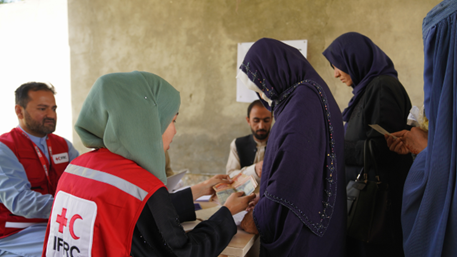Afghanistan

Humanitarian Crisis in Afghanistan
Herat Earthquake
How the Canadian Red Cross is helping
Canadian Red Cross support to date
How people living in Canada can help people impacted by crises in Afghanistan
Humanitarian Crisis in Afghanistan
For the past four decades, millions of people across Afghanistan have suffered the devastating humanitarian consequences of armed conflict. People live in fear for their lives and for the future of their children.
Afghanistan remains one of the world's poorest countries. Widespread poverty and the breakdown of the country’s infrastructure have left people without access to even the most basic supplies and services. Families are in dire need of basic assistance such as food, clean water, sanitation, and health care. Additionally, the country faces recurring natural disasters such as droughts, floods and earthquakes which impact hundreds of thousands of people each year. Education, health care and human rights have been steadily deteriorating.
Over 28 million people in Afghanistan require humanitarian assistance, largely due to the three years of drought.
The Red Cross Red Crescent Movement plays a vital role in supporting Afghan people. The Afghan Red Crescent Society has been working tirelessly for almost 90 years to deliver essential humanitarian services to many of the hardest to reach areas in the country. Their large local network makes it possible for them to reach people across all provinces, providing life-saving aid to men, women and children. This support includes relief supplies and cash assistance for families who are facing food shortages and loss of income. The Afghan Red Crescent Society is also supporting women-headed households to generate income.
Herat Earthquake
On October 7, 2023, a series of earthquakes struck western Afghanistan. An estimated 1.8 million people have been impacted by the earthquake, including 50,000 people in Zinda Jan, Herat at the epicentre. Many residents were tragically trapped under the rubble, necessitating urgent search and rescue operations. Authorities have confirmed at least 2,500 deaths due to the earthquake. Over 1,500 houses have been destroyed, leaving people exposed to the elements.
The Afghan Red Crescent Society is at the forefront, actively engaged in all provinces, including Herat, providing urgent search and rescue operations.
- More than 100 volunteers have been mobilized for the earthquake response in Herat.
- Volunteers are also providing much-needed relief in other affected areas. In at least six villages, not a single house remains standing, making the situation critically urgent.
- Health teams were deployed to address medical needs.
- Urgent non-food items including blankets, jerry cans, kitchen sets, and tarpaulins were distributed.
How the Canadian Red Cross is helping
The Canadian Red Cross welcomes the Government of Canada’s legislative changes aimed at reducing barriers to providing humanitarian assistance inside of Afghanistan. We view these changes as a critical step forward in protecting our ability to provide impartial humanitarian assistance in Afghanistan and other complex contexts.
Canadian Red Cross support to date
The Canadian Red Cross has a longstanding partnership with the Afghan Red Crescent Society, working together to meet the immense humanitarian needs in the country, with a focus on health services and disaster response and readiness. This collaboration has allowed Afghan Red Crescent Society teams to provide crucial support, which for many, have been their only source for assistance and comfort during crises.
The Canadian Red Cross provided support to the Afghan Red Crescent Society to establish a mobile health care team. From 2016 to 2018, with assistance from Canadian Red Cross, the Afghan Red Crescent Society was able to deliver more than half a million health care services to people without regular access to primary health care facilities, especially in geographically inaccessible areas or in dangerous security conditions. The services included healthcare support to mothers, newborns and children as well as health education, and vaccinations.
During the time when Canadian Red Cross supported the Afghan Red Crescent Society, there was a notable improvement in maternity care services across all provinces.
From 2013 to 2017, the Canadian Red Cross collaborated with Global Affairs Canada to strengthen the Afghan Red Crescent’s capacity to deliver health care and disaster response services, including support for COVID-19 preparedness. Thanks to generous support from the Temerty Foundation, the Canadian Red Cross continued to support the Afghan Red Crescent Society in operating mobile health teams until 2022.
Through these collaboration efforts, the Canadian Red Cross and its partners in the Red Cross Red Crescent Movement have made a vital contribution to help improve the lives of millions of Afghan people, providing essential aid and support in their most challenging times.
How people living in Canada can help people impacted by crises in Afghanistan
The easiest way to support the work of the Canadian Red Cross is to donate to the Afghanistan Humanitarian Crisis Appeal online, or by calling 1-800-418-1111. Making a financial donation is always the best way to support our humanitarian efforts on the ground.
Money raised will enable the Red Cross and Red Crescent in Afghanistan and in and around the region to provide support to people hit hard by multiple humanitarian crises. The support would include health care and relief supplies for individuals and families, displaced populations, and those experiencing food insecurity. Funds will also be used for immediate and ongoing relief efforts, long-term recovery, resiliency, and preparedness for future events in and around impacted regions, including consequential events related to the current crises.
